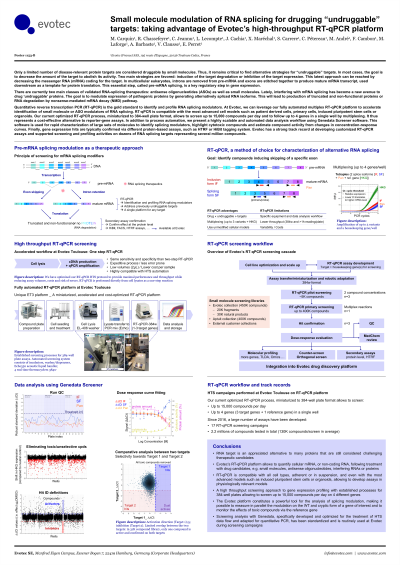Screening Applications & Diagnostics
Poster Session B
(1153-B) Small molecule modulation of RNA splicing for drugging “undruggable” targets: taking advantage of Evotec’s high-throughput RT-qPCR platform
Wednesday, May 29, 2024
10:30 - 11:15 CEST
Location: Exhibit Hall


Mélanie CARQUIN, PhD
Research Scientist_Project Leader
Evotec
Toulouse, Midi-Pyrenees, France
Poster Presenter(s)
Abstract: Only a limited number of disease-relevant protein targets are considered druggable by small molecules. Thus, it remains critical to find alternative strategies for “undruggable” targets. In most cases, the goal is to decrease the amount of the target to abolish its activity. Two main strategies are favored: induction of the target degradation or inhibition of the target expression. This latest approach can be reached by decreasing the messenger RNA (mRNA) coding for the target.
In multicellular eukaryotes, introns are removed from pre-mRNA and exons are stitched together to produce mature mRNA transcript, used downstream as a template for protein translation. This essential step, called pre-mRNA splicing, is a key regulatory step in gene expression. RNA splicing defects can lead to mutations and is associated with a large array of diseases, including cancers or Duchenne muscular dystrophy (DMD).
There are currently two main classes of validated RNA-splicing therapeutics: antisense oligonucleotides (ASOs) as well as small molecules. Risdiplam has been the first approved small molecule splicing modulator for spinal muscular atrophy (SMA), and several ASO-based therapies have been approved by the U.S. Food and drug Administration (FDA) for the treatment of DMD, such as Nusinersen or Viltolarsen. Lately, interfering with mRNA splicing has become a new avenue to drug ‘undruggable’ proteins. The goal is to modulate expression of pathogenic proteins by generating alternatively spliced RNA isoforms, that will lead to production of truncated and non-functional proteins or RNA degradation by nonsense-mediated mRNA decay (NMD) pathway.
Quantitative reverse transcription PCR (RT-qPCR) is the gold standard to identify and profile RNA splicing modulators. At Evotec, we can leverage our fully automated multiplex RT-qPCR platform to accelerate identification of small molecule or ASO modulators of RNA splicing. RT-qPCR is compatible with the most advanced cell models such as primary cells, induced pluripotent stem cells or organoids. Our current optimized RT-qPCR process, miniaturized to 384-well plate format, allows to screen up to 15,000 compounds per day and to follow up to 4 genes in a single well by multiplexing. It thus represents a cost-effective alternative to reporter-gene assays. In addition to process automation, we present a highly scalable and automated data analysis workflow using Genedata Screener software. This software is used for rapid characterization of large sets of molecules to identify splicing modulators, highlight cytotoxic compounds and estimate compound activity from changes in concentration-response curves. Finally, gene expression hits are typically confirmed via different protein-based assays, such as HTRF or HiBit tagging system.
Evotec has a strong track record at developing customized RT-qPCR assays and supported screening and profiling activities on dozens of RNA splicing targets representing several million compounds.
In multicellular eukaryotes, introns are removed from pre-mRNA and exons are stitched together to produce mature mRNA transcript, used downstream as a template for protein translation. This essential step, called pre-mRNA splicing, is a key regulatory step in gene expression. RNA splicing defects can lead to mutations and is associated with a large array of diseases, including cancers or Duchenne muscular dystrophy (DMD).
There are currently two main classes of validated RNA-splicing therapeutics: antisense oligonucleotides (ASOs) as well as small molecules. Risdiplam has been the first approved small molecule splicing modulator for spinal muscular atrophy (SMA), and several ASO-based therapies have been approved by the U.S. Food and drug Administration (FDA) for the treatment of DMD, such as Nusinersen or Viltolarsen. Lately, interfering with mRNA splicing has become a new avenue to drug ‘undruggable’ proteins. The goal is to modulate expression of pathogenic proteins by generating alternatively spliced RNA isoforms, that will lead to production of truncated and non-functional proteins or RNA degradation by nonsense-mediated mRNA decay (NMD) pathway.
Quantitative reverse transcription PCR (RT-qPCR) is the gold standard to identify and profile RNA splicing modulators. At Evotec, we can leverage our fully automated multiplex RT-qPCR platform to accelerate identification of small molecule or ASO modulators of RNA splicing. RT-qPCR is compatible with the most advanced cell models such as primary cells, induced pluripotent stem cells or organoids. Our current optimized RT-qPCR process, miniaturized to 384-well plate format, allows to screen up to 15,000 compounds per day and to follow up to 4 genes in a single well by multiplexing. It thus represents a cost-effective alternative to reporter-gene assays. In addition to process automation, we present a highly scalable and automated data analysis workflow using Genedata Screener software. This software is used for rapid characterization of large sets of molecules to identify splicing modulators, highlight cytotoxic compounds and estimate compound activity from changes in concentration-response curves. Finally, gene expression hits are typically confirmed via different protein-based assays, such as HTRF or HiBit tagging system.
Evotec has a strong track record at developing customized RT-qPCR assays and supported screening and profiling activities on dozens of RNA splicing targets representing several million compounds.
